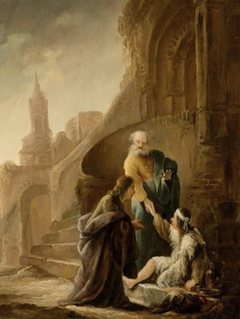 While working on sermon prep on my text (Acts 4:1-31) for the weekend sermons (at the Saturday Sidewalk Church & Sunday service) a small part of the text hit me: “by the name of Jesus Christ of Nazareth” (Acts 4:10b). Back in my early years as a Christian, I spent hours memorizing Bible verses (and sometimes paragraphs and even whole chapters). One of the first verses committed to memory was Acts 4:12: “And there is salvation in no one else, for there is no other name under heaven given among men by which we must be saved.” Although I have studied the passage and preached on Acts 4 many times, it never occurred to me that the “no other name” is not simply “Jesus” but “Jesus Christ of Nazareth.” For, basically in one breath (a short 2 verses earlier), we learn that the man in the story was healed “by the name of Jesus Christ of Nazareth” and this is the name “given among men by which we must be saved.” Jesus Christ of Nazareth. Of course, “Christ” means Messiah, the anointed One, the long awaited promised One of Israel. The little preposition “of” (before Nazareth) has to be explained, defined. Probably because the following noun is a small village, it is fair to render Acts 4:10b, “by the name Jesus, the Messiah, from Nazareth.” “Jesus of . . . Nazareth” is more common than one realizes in the New Testament. Obviously, not the most common title, but still 17 or so times. In Acts, Luke uses it seven (7) times in relationship to Jesus (Acts 2:22; 3:6; 4:10; 6:14; 10:3, 8; 22:8; 26:9); and, once Jesus’ followers are referred to as “Nazarenes” (Acts 24:5). Identifying Jesus as being from Nazareth would not have been good PR, nor would it ingratiate the accusing crowd toward Peter and John. In other words, it didn’t help the situation at all. There would have been shame not honor in being from Nazareth. The significance of attaching “Nazareth” to Jesus’ name is further affirmed in the gathering of the Jerusalem aristocracy in the Acts 4 scene—“Annas the high priest and Caiaphas and John and Alexander, and all who were of the high-priestly family” (4:6) verses Peter and John who “were uneducated, common men” (4:13b). Furthermore, let us not overlook this whole incident is the consequence of Peter and John healing a lame beggar (Acts 3:1-10). Note that this healing—the actual occasion in chapter 3—was “in the name of Jesus Christ of Nazareth” (3:6b), the very name under heaven by which we must be saved (4:12). The reference here to Jesus being from Nazareth and the power to heal and the gospel preached in the name of Jesus Christ of Nazareth is not incidental. It is central to the story—and to the word being spoken here. We should stop to consider what it meant to refer to Jesus as the Nazarene or from the village of Nazareth. Remember (we all remember) Nathanael’s words to Philip after he was told they had found the Messiah: “Can anything good come from Nazareth?” (John 1:46). This alone gives the impression that Nazareth was not a big deal, more likely an inferior place, low socially. The bad side of town. Nazareth was a very small, insignificant Galilean village. So much so that one, more recent, writer put it, “God grew up in a forgotten town.” The fact that we know very little about Nazareth from ancient writers is telling, in that it was an uncelebrated, forgotten little village, “off the beaten path, even for Galilee.” Being called a “Nazarene” would have been a stigma that Jesus would carry his whole life and, literally, beyond. Yet, this is the only name under heaven—the name of Jesus Christ of Nazareth—by which anyone can be saved. The gospel early on was attached to the two worst social aspects imaginable: the cross and where Jesus was from, namely an insignificant, small, lowly village in the dark Gentile land of Galilee, Nazareth. Naming Jesus from Nazareth would have been, not only geographically a faux pas, but a social blunder, something that would have discredited “the name.” And, thus the messengers. But it is the name by which we must be saved. No power in palace, privileged place, nor powerful earthly names. Not one. The gospel—right away—in the story is associated with a lack-luster, shameful, insignificant name. Luke’s story tells us immediately that the gospel was associated with the poor and insignificant. It was essential to the story. Luke made it so in the name. In the church world, this seems to be the opposite now. We announce there is another name by which we can be saved, one not necessarily associated or from Nazareth. But we must, for there is no other name under heaven by which we must be saved, and that is the name of Jesus Christ of Nazareth. This spoke powerfully to those at the Saturday Sidewalk Breakfast & church and reminded our Sunday congregation of our mission and purpose in the Hill.
0 Comments
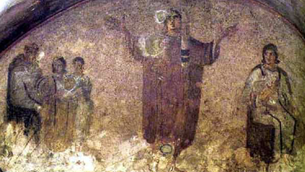 Some sermon prep thoughts . . . the fuller text is Galatians 3:23-4:7 . . . and yes, this is a Christmas Season Sermon text . . . See Galatians 4:4. The part I am reflecting on is the well known Galatians 3:27-39: “For as many of you as were baptized into Christ have put on Christ. There is neither Jew nor Greek, there is neither slave nor free, there is no male and female, for you are all one in Christ Jesus. And if you are Christ's, then you are Abraham's offspring, heirs according to promise” (Galatians 3:27-29). I am not sure that we fathom how radically deconstructing these words would have been for the Greek, Roman, and Jewish man, especially male head of households, who were also masters of household slaves . . . nor can we (but we should) grasp the radical reconstruction and liberation these same exact words would have been to the Greek, Roman, and Jewish women and slaves and free (emancipated) slaves, who had no home or legal status whatsoever . . . interestingly we forget that Paul just mentioned sonship (“you are all sons of God, through faith,” v. 26) and will soon talk again about sonship and heirs (Gal 4:1-7), that is, being sons of God. I know we like to be modern and relevant and say “sons and daughters of God,” attempting to get past the so-called ancient gender-bias; but this is both unwarranted and does injustice to the text in its culture—depriving the Christian, especially the female Christian, of its impact. “Sons” were everything in the Greek, Roman, and Jewish world. They got everything. They had far more respect. They got citizenship. And if you were the first born male, an heir to family wealth, possessions, land, and legacy. The goal of marriage to the Greek and Roman was to produce a legitimate male heir citizen for the Empire. So, to deprive the female Christian direct title “son” with all of its rights and privileges (as it would have meant to the ancient world reader) would simply be not right, unfair, unjust, unbiblical . . . it would not be Christian. The impact of such sonship on the Jew, the Greek, slave or emancipated slave is left with no contemporary translative spin—as it should be. Yet, our cultural sensitivity (although sincere and well-meaning at times) toward the gender-bias we have robed the sister in Christ of the applicable impact on her status as a “son of God.” And, for sure, this simple slight of hand turning “sons” into “sons and daughters” makes us (you know I mean, us brothers) feel as if we’ve (they’ve) solved all the gender-bias (male-dominating, male-centrism) within Christianity and its religious systems, habits, and attitudes with one easy “translation” fix. In some since, this translative adaption helps to lessen the power of this text to deconstruct our male-centeredness and robs the church from allowing the place of the female to be reconstructed into the place of a “son of God.” It is no wonder the early church grew as it did . . . and it is no wonder why women were especially attracted to the fulness of time when God sent his son, “born of woman, born under the law, to redeem those who were under the law, so that we might receive adoption as sons” (Gal 4:4).
 “Whoever does not receive the kingdom of God as one receives a homeless person will never enter it.” Here are some streams of thought that sprung from my sermon prep on Luke 18:15-30 (which is posted fully at the end). For now, this passage is two stories that are most definitely linked together: Infants and children being brought to Jesus for a blessing, being told that the kingdom of God belongs to them, and a rich young ruler who asks how he may obtain eternal life. Additionally, the previous Wasted Blog post is a part of this stream of sermon prep thought: A blunt text, rationalizing, and a confession: a brief reflection on Luke 18:22. There is little doubt that this is about the gospel and the poor: who are we?The wider section of Luke 14-18 that we have been journeying through during the Saturday Sidewalk Sermons and Sunday morning sermons reveals whom we are to seek and welcome to the Table of God‘s Kingdom--that is, whom are to be invited to salvation in Christ, that is eternal life. There is little doubt, the invitation is for the least among us . . . don’t get me wrong, of course, the wealthy and well-off and those who have the privilege and blessings of this age’s systems and structures are invited to come sit with them (it seems this is the Gospel process). In our current passage (Luke 18:15-30), the young rich ruler is instructed to give his wealth to the poor . . . two things to be noted here: 1) for those that didn’t catch this earlier on my facebook feed, this principle was understood by both Jesus and his disciples as a principle to be followed broadly by the rich if they were to be followers of Jesus; and 2) this was what Jesus was modeling--something this young rich ruler could not, in the end, imagine doing, for he walked, sadly, away from Jesus’ gracious invitation to enter the kingdom of God. Perhaps on this Day of giving thanks, we can find a way to give away what we have to the least among us. Most of us will give thanks around a Thanksgiving table for the bounty God has given to us--often accompanied by a comparison to those who have little or nothing (“Lord, we thank you for what we have, for we know that so many are not as fortunate,” et al.) . . . this is more in line with the Pharisee in the preceding parable, who compared himself to others. The parallel in the Luke 6 Beatitude: The kingdom of God belongs to the poorA thought from my sermon text, Luke 18:15-30: the reference to the kingdom of God belonging to the children means these two stories are a poor vs. the rich contrast and we should suspect that deconstruction, a reversal, is afoot: V. 16: But Jesus called them to him, saying, “Let the children come to me, and do not hinder them, for to such belongs the kingdom of God” (ἐστὶν ἡ βασιλεία τοῦ θεοῦ). Note the parallel: Luke has already told us back in chapter 6 that “Blessed are you who are poor, for yours is the kingdom of God” (ἐστὶν ἡ βασιλεία τοῦ θεοῦ. 6:20). And surprise, surprise, the very next thing is a scene of a rich young ruler wanting eternal life (i.e., entering the kingdom of God), who is then told to give to the poor, and walks away from (eternal life!) “because he was wealthy.” Recall how Luke presents the Kingdom Beatitudes back in chapter 6 . . . he parallels the poor/kingdom (6:20) with “But woe to you who are rich, for you have received your consolation” (6:24). I’ll leave it right here . . . Love God, Love Your NeighborLuke 18:16 (just a verse from my whole text, Luke 18:15-30): “But Jesus called them to him, saying, ‘Let the children come to me, and do not hinder them, for to such belongs the kingdom of God.’” When the rich young ruler had heard Jesus say that the kingdom of God belonged to incomplete adults, those not fully human, that is children, this begged a question pertinent to his station and social status (which was good because he was wealthy, which meant he had a name that counts and a status that allowed all the privileges and, of course, he was a grown male which made him fully human). That question was, “Good Teacher, then how do I inherit eternal life*?” He obviously knows how to inherit riches: be born in a legacy family and be a grown male—this is the Rome-way. It is not Jesus’ way . . . this is what concerns that rich young ruler. As it should. As it should also concern us. While Jesus is far more than a mere Teacher as the rich young ruler had addressed him, he picks up on the word “Good” to help the young rich ruler grasp he is asking a first-commandment question—God is the only good, so remember, Love the Lord Your God first—but in the next breath Jesus directs the wealthy ruler to the second--which is like the first (cf. Matthew 22:39)—command, namely to Love Your Neighbor. Thus, give-God-all-you-got is to be met with selling-all-you-got-and-giving-it-to-the-poor, these are the twin sides of inheriting—not earthy riches, that’s easy, just be born with a name and have the right address—of inheriting eternal life. Not sure we’ve actually come to grips with this side of the gospel . . . it’s there, right in our text for Sunday morning (Luke 18:15-30). *The kingdom of God, eternal life, and being saved are all interchanging terms and concepts in Luke. An ellipsis: whoever models Jesus gets to enter into the kingdom of GodI grant the last of this thread is far more application than exegesis (but it’s that, too), yet it is an application that is a faithful reading and dynamic equivalent [you’ll see I do some translating here] to Luke’s and Jesus’ narrative intent (and of the Greek) found in Luke 18:15-30, specifically, verses 16-17: “But Jesus called them to him, saying, ‘Let the children come to me, and do not hinder them, for to such belongs the kingdom of God. Whoever does not receive the kingdom of God like a little child will never enter it’” (ESV). There are a number of things that are before us in the text, for they would have been before both the original audience of disciples and Pharisees, and, as well, those to whom the Gospel was written, namely Theophilus’ church community: 1) As already mentioned, infants and children would have been considered not fully human, incomplete adults, one the lower tiers of human hierarchy, both in the Jewish and the Greco-Roman world; 2) Children/infants simply would not have been presented, especially in public, to any Rabbi (and I note that Jesus is referred to by the rich young ruler as Teacher, aka a rabbi); 3) There would be ritual impurity amid the presentation of the infants that would have been improper for Jewish Rabbis, but obviously Jesus is impervious; and 4) Finally, there is an ellipsis in verse 17 that needs to be understood. Allow for an explanation of the ellipsis before moving on to my application (which reveals the intent of Jesus and Luke here): a grammatical ellipsis, whether written or spoken, is when some words are missing yet assumed, offering some balance to the thought or sentence that is implied by the author and supplied by the hearer/reader. Examples: “John saw two hawks in the sky, and Bill saw three” and “Amanda is managing the restaurant Thursday, and Joseph is Friday.” The second example is like our Luke 18:17 ellipsis, in that the verb “manage” is left out but is clearly intended. The ellipsis in Luke 18:17 is the verb “receive.” The ellipsis is masked by the English word “like” (i.e., “like a child”). The word “like” implies to the English reader that it is the children we should be like. However, the ellipsis being crafted here is to imply that it is the “receiving” that we are to be like. Here’s my translation so you can here and see how the ellipsis works:
The “infants” and “children” are not coming or receiving Jesus in this story. They are not coming to Jesus because of something about them--we infer this, but it is not there in the text and the social/cultural location suggests otherwise. And, it is the parents who are bringing them to Jesus and Jesus is receiving them. Thus, the set up for the intended ellipsis. We should make a narrative link to what Jesus is doing. This is exactly what Jesus is modeling, “receiving children.” He is not receiving children as a child or like a child would--that’s our hallmark-card spin on it--but Jesus is doing the receiving, the welcoming of the children. This reading of the text, and hearing the cultural view of humans that is at play, allows us to apply this warning concerning the unavailability of the kingdom to those who do not welcome/receive children because Jesus has reversed the poles in His kingdom. Now, if we read--as we should--the other aspects before us in this text, namely infants/children would have disturbed the piety of a rabbi (i.e., the clean vs unclean) and the view that receiving them counters the tiered humanity prevalent at that time . . . it would be fair to render this verse: “Whoever does not receive the kingdom of God as one receives a homeless person will never enter it.” Of course, you can change “homeless” to be anyone whom you believe is less than human or unclean . . . and not only believe, but live in such a way that your modeling is nothing like Jesus’ model . . . and the danger? You will not enter the kingdom of heaven. This is affirmed by the next story of the rich young ruler choosing not to model Jesus and turns away from the kingdom. Luke 18:15-30 (ESV)
 This is both blunt and transparent . . . Luke 18:22, a verse in this Sunday's Sermon text . . . “When Jesus heard this, he said to him, ‘One thing you still lack. Sell all that you have and distribute to the poor, and you will have treasure in heaven; and come, follow me.’” In a few seconds, after the rich ruler walks away “sadly,” Jesus then says: “How difficult it is for those who have wealth to enter the kingdom of God! For it is easier for a camel to go through the eye of a needle than for a rich person to enter the kingdom of God.” There is no doubt this is to be applied rather broadly and not to be rationalize, “Well, this was to one person and God doesn't call every rich person to do this,” for the disciples understood it to apply to all rich people, “then who can be saved then?” Those who typically have the authority to interpret texts like this one are from among those with elevated status in the social structures, i.e., those who rule and have wealth—you can see the conflict of interest here. I do. I feel that conflict myself. I am not exempt from “spiritualizing” or looking for exemptions for this text. We all scramble to exempt ourselves, somehow, from this--no matter the size of our paycheck and bank accounts. Me, too. I have always been rather plagued by this text. But after 40+ years of following Jesus (and this is a “follow Me” text, cf. 18:22d), I wonder if we are so attached to this world—as the Rich Mullins song says, the stuff of earth competes for our allegiance—that we are not free to actually follow Jesus in the way the Gospels teach us? I confess, this week’s sermon text rattles me. And more so because it’s a feast week! Thanksgiving. And it’s cold out. There are homeless surrounding me. And I live amid scarcity.  While the Pharisees and scribes grumbled that Jesus was receiving tax collectors and the marginal, the uneducated, outcasts living in “the streets and lanes of the city,” and “the poor and crippled and blind and lame” (14:21), eating with them, Jesus asked them a question:
The question sets up an expected answer: “No, no-one would do that!” Such a decision puts the 99 at risk (stop thinking Jesus means for us to assume the shepherd left the 99 well attended—that would spoil the story all together—not sure we are to assume nor fill in the blanks). Simply we have, you see,“Lost sheep happen.” Still, the angle Jesus shoots for is dangerously shocking: this rather well-off Shepherd (having 100 sheep would have indicated he leaned toward being a more wealthy Shepherd) goes and seeks his lost sheep, carries it home, and everyone rejoices. This is the counter to the grumbling of the Pharisees and scribes that Jesus was welcoming and eating with the likes of those strays from Galilee and the marginal he'd been picking up while on his way to Jerusalem. While it is good to see the Shepherd as a picture of Jesus, this leaves the listener/reader with nothing to do but contemplate how much Jesus loves him. A good thing and important, sure, but that’s not Luke’s point. This is a counter to the Pharisees and scribes, which should indicate what we have here is a counter-intuitive correction to the church’s proclivity toward doing exactly what the Pharisees and scribes were doing: neglecting the poor and marginal and socially unacceptable, whether it be to affirm the cultural and socially tiered-hierarchies (both church and outside the church) and/or to not be so unwelcoming of such among them as a church and/or creating and maintaining institutional systems that affirms and sustains the haves/have-nots at church (cf. the problem in James). This is exactly what the previous Banquet parable was about in Luke 14. Additionally, the interlude on discipleship just prior (14:25-33) instructs us that discipleship is following Jesus, and thus we have our marching orders here in this (and the next two) parables of Luke 15.
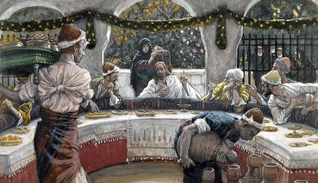 “One Sabbath, when he went to dine at the house of a ruler of the Pharisees, they were watching him carefully. And behold, there was a man before him who had dropsy. And Jesus responded to the lawyers and Pharisees, saying, “Is it lawful to heal on the Sabbath, or not?” But they remained silent. Then he took him and healed him and sent him away” (Luke 14:1-4). I take it that Jesus could have engaged from a range of folks who surrounded this supper meal with a few different types of maladies needing to be healed. This man with “dropsy” was not a part of the table fellowship, that is one of the invited guests at the Pharisee’s supper party. This man with “dropsy” most likely was from the crowd of folks who would have been outside watching the supper party, for Jesus “took him and healed him,” then “sent him away.” Remember such meals would have been semi-public in that people would have shown up, outside, to see who was there, who sat where and next to whom. This was common in those days. Again, these meals functioned in Jesus’ world to establish the “in-group” and to set boundaries, and as well, in the Jewish world to inform and embody (and enforce) the religious values of ceremonial purity. This man with “dropsy,” whom Jesus most likely pulled in from the surrounding on-lookers (cf. Luke, after all, does tell us Jesus “took him”). This would have violated the purity laws for sure, especially in a ruling Pharisee’s home! Additionally, the table-etiquette would have also been to demonstrate and enforce who the ”wrong people” were. This man was "wrong people"! Gentile and Jewish meals were occasions to to “advertise and reinforce social hierarchy.” The choice to heal a man with “dropsy” was a surgical strike. I am sure the man had the sickness known as dropsy and was healed, but there was an ulterior lesson to happen among the invited guests and host in the instruction to be given by Jesus to those reclined at that table. The disease of dropsy causes someone to thirst, actually to have an unquenchable thirst, even to the point of dying because of drinking too much water. Thus, there was an association with the “thirst” for money or status, often referred to as “dropsy.” In the ancient Greco-Roman world writers would refer to the insatiable nature of greed as “dropsy,” for as with other desires that could be satisfied, no matter how much a greedy person acquires, it would never be enough--in terms of wealth and social status. So, the healing of the man with dropsy was parabolic of the host, the honored guest (or guests), and others seated around that table. This healing on the Sabbath of a man with dropsy exposed that those who reclined at that table also had a disorder, a malady, that was no less self-detrimental. Jesus’ two parables at this supper table affirm this: First, the parable of the wedding feast is about seeking honor and establishing one’s status and place among others (14:7-11). The second parable was about a great banquet feast (vv. 12-24) that would have exposed the motives for invitations to such a table, namely there would be a good return, a payback, an invite to their own parties, a status affirmed. However, they were to invite the poor and powerless that cannot repay them or give them some advantage of association. Interestingly, immediately following this event at the ruling Pharisee’s supper party, there is an interlude concerning the cost of discipleship (14:25-33), namely that following Jesus puts one at odds with the established honor system of friends and family and work associates. Not only do these parables at the Pharisee’s supper table expose hearts of greed (aka, hearts of dropsy), they also instruct us—the reader/listener—that we, as follower of this Jesus, are not to seek our own honor or bid attention for leverage in our social groups, and that; thus, with such platforms we are to invite and associate with those who cannot pay us back or build up any honor or social leverage. The Pharisees reclined at that table exploited hospitality for their self-serving agenda and used this acceptable form of hospitality “to secure their positions of dominance in their communities and insulate them from the needy.” Yet, Jesus was acting in such a way to indicate that the transformation of the world had already begun. This would speak to the church community, the listeners and readers of Luke’s Gospel of the importance of the new age re-socialization (i.e., the deconstruction of current social norms and the reconstruction) of God’s new community. Which does your church and Christian life depict? The table of those with social-cultural dropsy, where the patterns, platforms, and powers play out for higher honor, advantage and leverage, and social affirmation; or, the table, the new community of God, that deconstructs social and cultural associations designed to lift your esteem and status and demonstrates that the kingdom of God, the redeemed transformation, has begun? Church should demonstrate the new age of God’s kingdom has begun. But perhaps our hearts need to be healed of dropsy. Whom do you associate with? Whom does your church intentionally associate with? Whom do you invite to your tables?
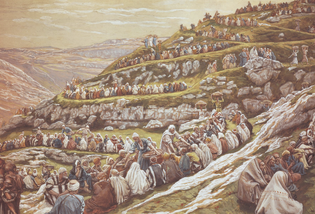 The feeding of the 5000 in Mark 6 is a miracle story that reveals who Jesus is—most assuredly. Yet still, Mark’s purpose in writing a gospel for the church community in Rome to be read out loud at the symposium following their supper gatherings (what we might call a church gathering) was to build the church, mature the congregation’s faith, and teach what it means to follow Jesus and acknowledge him as Lord, raised from the dead. More so, Mark’s Gospel, including this feeding of the multitude story, was (and still is) to prepare the church for the persecution, hardship, and the difficulty of being the church while staying faithful to its mission and Lord. The Mark 6 feeding of the five thousand is as much about who the church is as it is about who Jesus is. While the miracle itself is revealing of who Jesus is and certainly links the reader back to the Old Testament Exodus under Moses (thus, picturing a new exodus under One better than Moses, giving the new mana), this is a discipleship story that has a discipleship point to be made to the readers/listeners. First, three times in the space of five verses the word “desolate” (“desert,” actually, “wilderness” is best) is used in a fourteen-verse story—over a third of this vignette on the feeding the 5000 focuses on where this event takes place. And, if we count the reference to “green grass” (v. 39) where Jesus had the crowd sit to be served, this story does indeed focus the reader/listener’s attention on the place of this story; thus, giving a clue to its importance on the subject of discipleship--what does it mean to follow Jesus? Second, the story is mostly about the newly appointed “apostles,” the twelve “sent ones” (6:7-13), who had just returned (v. 30) from the mission Jesus had sent them. The story begins with their return, reporting, and Jesus taking them to some spot—a “desolate place,” a grassy space of wilderness—to eat and rest. “Leisure” (as in “had no leisure even to eat,” v. 31c) is an unfortunate word choice of the ESV, for it gives the impression of fun, earned vacation or a weekend (perhaps), or an extended break from work—here, it simply means a few moments to rest so the disciples can eat. Then, after finding their own “desolate” place to eat, the crowd from nearby towns followed and found “them” (v. 33)—Jesus and the disciples, who had just been going through their towns preaching the kingdom of God. After Jesus spent some time teaching the crowd, the apostles “kindly” mentioned to Jesus that the crowds, who had followed “them” to their desolate place (v. 33), needed to find their own food in some other place (vv. 35-36). While we often focus on Jesus in this story, Mark keeps the “apostles” front and center. Just after the disciples request the crowd be sent away to buy their own food, Jesus instructs them: “You give them something to eat” (v. 37a)--they were their eating (by-the-way) and obviously had food; something from their own resources. Still complaining, the disciples sarcastically say, “Shall we go and buy two hundred denarii worth of bread and give it to them to eat?” (v. 37b). (The disciples really wanted to get this crowd to go away!) Paying no mind, Jesus asks them to gather what they had left from their food—“Five [loaves], and two fish” (v. 38c). Then, Jesus instructs the 5000 to sit in groups of hundreds and fifties (like Moses did) and after blessing this paltry amount of food for such large a crowd, gives the food to the disciples to set before all the people—in other words, to serve the crowd food in that desolate place they had originally found to “get away and eat themselves.” A quick aside: The miracle in this story is very linked to the disciples, for the multiplying of the bread and fish come, not in some surreal miraculous moment, but through the serving of the bread and fish by the disciples—so even here, the story focuses on the disciples. As you can see, while the feeding miracle stands out (and is, of course, important), but the story has the multiplication of the loaves and fish in the serving by the disciples to the people. The content of this story focuses our attention on the disciples—more so, on a discipleship moment. So what’s happening here? Yes, at the very moment the new exodus is revealed, displayed in the feeding of the 5000, and Jesus is revealed as the ultimate Moses, the disciples first find a spot to eat and are interrupted by the crowd who had followed “them” to this desolate place, and, then, wanted to turn them away when it was time for the crowd to eat. There is some irony here for sure. As I had mentioned before in a previous Facebook post: I believe, the readers on this side of the text are to hear that Jesus is setting his disciples up for a lesson—a learned experience, a discipleship moment—in what it means to be a disciple, a follower of Jesus. We, his church, Jesus’ disciples are how the bread and the fish multiply. This is revealed in the focus on the disciples and the desolate place in this story. Later, after the resurrection and as the church increased, this can be seen in the multiplying of tables (in supper rooms) of gathered believers starting in Jerusalem and spreading all the way to Rome and eventually filling and overtaking an empire. We can see this revealed in the multiple references to supplying the needs of the poor in the New Testament. And, that the original (not so much, sadly, later in church history, even up to now) gathering of strangers and unequals (i.e., gathered churches) provided a platform and venue for the poor’s needs to get met, including a meal. The Lord’s supper was a supper after all. We learn of discipleship here: following Jesus is going to interrupt a disciple’s life. Needs are going to be met out of His disciples resources. Meeting needs in inconvenient space, space we thought was for our leisure, is a sign that the Kingdom of God has come. It is proclaiming Jesus—of course use words. But that’s what the disciples did on their short-term mission just prior to this episode. So, the narrative point (Mark’s narrative point) was to move the disciple’s notion of ministry beyond words to illustrating the arrival of the Kingdom in Jesus. Remember, the miracle of multiplying the food was through the serving of the disciples—just at the time they needed rest and needed some leisure time. Ministry and mission, meeting needs and serving—all should be expected to interrupt and invade our leisure space.
 Rain (which it is doing) doesn't keep folks away from the breakfast; and they waiting around for the service. Rain (which it is doing) doesn't keep folks away from the breakfast; and they waiting around for the service. “But do you think they’d come if you didn’t serve a breakfast or hot dogs?” Probably not, for the most part. Imagine someone walking up to Jesus during the feeding of the five thousand and saying, “They’re only here for the food, you know?” I can imagine Jesus’s reply: “So?” I get this and similar questions and statements all the time about our weekly Saturday sidewalk breakfast and church service and the summer Wednesday evening Park BBQs. Usually, from the well fed and safely sheltered, I might add. And, plus, what’s wrong with doing something that seeks to meet a perceived need, let alone a real life need, and, in this case with us, so also to be able to tell them about their eternal need of forgiveness and that Jesus paid that price for them? Do not think “ordinarily church” (regular Sunday-go-to-a-building church) doesn’t do the same thing . . . most of church programs are to meet perceived needs and attract people or to get them to stay . . . children’s programs and activities appeal to parents perceived needs, family functions appeal to family perceived needs, even friendships appeal to perceived needs . . . almost all church activities include the “don’t forget to invite your . . . [friend, neighbor, co-worker, family]” clause to get the unchurched to, well, go to church through these programs and activities. Most VBSs, Christmas events, even Easter activities are designed to “attract” through something that a person or family perceives as important or needed. This is never questioned. But serve the poor and homeless food and the ordinary-gospel-church folks go crazy. Nevertheless, also, let’s remember there is direct biblical precedence (inference) in joining gospel & food, church & food, even preaching/teaching & food. Food is an element in Jesus’ ministry whether it is around a table or in a field or on a mount. It is a founding element in the young, newly born church well into the first 150 years of early church history, and still hanging on up to 350 AD until Constantine put the church in a box (i.e., a building) and took it out of the home and away from the actual meal (supper) table. We build ordinary on what we have always done and on the cultural, social, and structural habits we are accustomed to (e.g., a 5 day work/weekend–week for example or full time Monday-Friday jobs that give us evenings and weekends off—the young and early church knew of no such privileges). Making what we think is “ordinarily” based on our customs and culture—our own location in time, place, and space, we, then, read back into scripture and then affirm our “ordinarily.” But a non-ordinary people in a non-ordinary place needs non-ordinarily church. The sidewalk church in no way replaces the Sunday gathering. But it is church in a place and space where people will most likely never go to a building-church in a neighborhood outside (in most cases, way outside) their neighborhoods. Two things, outside the “So if they come for only the food” take: First, the homeless, the poor neighbors, those experiencing food scarcity (among all the other experiences of basic needs scarcity) can imagine an outside, year round (even in the rain and cold and snow) church being formed. It is hard for the well-buildinged (I made up a word here)—buildinged church, “an ordinarily church” to imagine such a church forming. Second, while it is still small, average on any given Saturday on the sidewalk is about 10, but some Saturdays upward to 16 to 18 and as many as 20, the weather doesn’t determine the numbers—the attendance—of people who join us for Sidewalk Church. Pouring rain. Zero and single digit cold. Snow, even blizzard. Nor hail. And not even hot and muggy . . . stops folks from coming and joining us. The “ordinarily church” that meets in a building and is mostly accessed by car can’t even imagine such faith. So . . . so what if they only come for the food . . . the breakfast . . . the hot dogs?
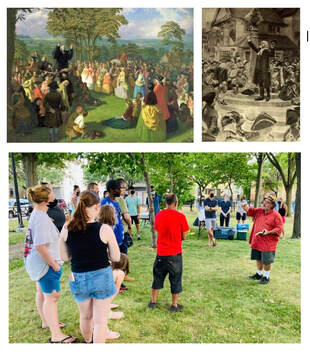 John Wesley's Journal, March 31, 1739: “In the evening I reached Bristol, and met Mr. Whitefield there. I could scarce reconcile myself at first to this strange way of preaching in the fields, of which he set me an example on Sunday; having been all my life (till very lately) so tenacious of every point relating to decency and order, that I should have thought the saving of souls almost a sin, if it had not been done in a church.” Because Anglican Church leadership had forbidden and barred their churches from allowing George Whitefield from preaching in their pulpits, he, then instead, took to the open air to preach. On February 17, 1739, Whitefield preached, for the first time, in the open air to about two hundred coal miners at Kingswood (near Bristol, England). Within three weeks, thousands began crowding to listen to Whitefield’s preaching. Soon, he called on John Wesley to come help him in this open air preaching. Though Paul and other New Testament figures took to the open air with the message of the gospel, Whitefield and Wesley (re)discovered (if you will) in these (as one author put it) “unsettled conditions,” open air preaching among “the neglected Kingswood colliers” (coal miners).
Soon even John Wesley was refused access to Anglican pulpits. Yet, that did not stop Wesley from preaching the gospel: On one occasion, because he was blocked from a pulpit in Epworth, his father buried just outside that church, Wesley famously stood on his father's grave and began to preach. Many came to listen. Whitefield and Wesley reached the “neglected” multitudes among us (which I call the “forgotten elect”*) with their open air preaching. And, none can say these outdoor masses weren’t discipled to mature their faith, for much of our present day discipleship is borrowed and built on Whitefield and Wesley’s “methods.” Now mind you, I am no John Wesley nor George Whitefield, and I haven't been banned from any pulpits (that I know of anyway) and, as far as I can tell, I am in good standing with my denomination, but yet, still, almost everyone who stands in front of me at our Summer "In His Midst" Park BBQs or on the sidewalk each Saturday does not attend church—so, for them it is moot why I preach outdoors, this is the only Gospel, the only church, the only pastoral care, and for some the only discipleship they are going to ever get. They are the neglected among us that regular, ordinary pulpits are not going to reach—by design, default, habit, or ignorance, it matters not. We cannot do ordinary church in a place where there are so many, what I call, the forgotten elect. No matter which theological background you come from, most of these good sinners will never enter a church building until it is too late. So, the Hill is my parish. Yes, there will be distractions and required other duties, but while God gives me breath and enables, I will seek to preach and reach these forgotten elect. *In this way, I am a little more Whitefield than Wesley, I get that. 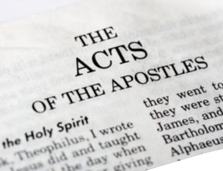 I have always been drawn to missionary stories. As a young Christian, it seemed, I read one or two a month. At that time, I thought I’d be somewhere overseas . . . ending up in some prison somewhere or in an unmarked grave in some distant jungle. I prayed, often—really, all the time—“Here I am! Send me.” [Which is, by the way, part of our text this morning, if you take the immediate context of the original OT Isaiah 6 quote in our Acts 28 text seriously--well, I certainly do). I prayed, “Send me.” God never did. Over there, anyway, to some distant shore or jungle. Didn’t have the privilege to reach the unreached, somewhere difficult, somewhere dangerous for the Lord. Until—until God, surprisingly, late in life, called me to the Hill. Sure. Not a foreign field. But a mission-field, nonetheless. Perhaps even more difficult in some ways—and at times, as dangerous. Early Wednesday mornings, Dr. Doug Bruce (an elder of CPC New Haven, our anchor church) and I would walk around the Hill talking and praying before he went to his office at the Hill Health Center. On one walk he told me he had been on the foreign mission-field and added, “What you have here in the Hill is just as, if not more, difficult as any mission field overseas.” Recently I have picked back up reading missionary biographies. In particular two have impacted me: John Paton, missionary to head-hunters of the South Pacific, and Amy Carmichael, missionary to orphans and the unclean of Southern India. John Paton (late 1800s) was a Presbyterian missionary to the New Hebrides headhunters of the South Pacific islands. Once Paton dared one of the chief priests to prove their gods by placing a death curse on him. The failure of their curse brought support for his ministry from some; murderous ambushes from others. Paton’s story (and it didn’t hurt that he was Presbyterian!)—his story was encouraging to me because it was impossible . . . headhunters, lost in time, ruthless, godless, some of the worst on the known planet. As I read Paton’s autobiography, I could not help but hear Paul’s words in 2 Timothy 2:10: “Therefore I endure everything for the sake of the elect, that they also may obtain the salvation that is in Christ Jesus with eternal glory.” [Written in Rome by the way, where our Acts 28 scene takes place. Not a coincidence.] Then, there is Amy Carmichael, died in 1951, who opened an orphanage and founded a mission in Southern India . . . and she hated fundraising . . . well-known for hating it too. She refused to paint a successful picture for her patrons, eschewed hitting all the sweet spots in telling stories that would provoke her supporters to continue giving. Someone eventually talked her into doing some support-raising and when she did, she said: “. . . we have tried to tell you the truth—the uninteresting, unromantic truth . . . The work is not a pretty thing, to be looked at and admired. It is a fight. And battlefields are not beautiful.” So, you’re finishing up the Acts of the Apostles. Now you know the story well, maybe even excited by it, motivated . . . we admire it . . . we want that! As David Wells of Gordon-Conwell Theological Seminary once wrote about the Acts of the Apostle: “We are impressed . . . impressed at how the disciples got the job done . . . we see the awe, we feel the coming of that power like a tidal wave sweeping all before it . . . If only our times were like theirs . . . They were accused of turning the world upside-down . . .” We want that! Yet, let’s not get sucked into admiring the scenes and stories in Acts . . . it . . . using Amy Carmichael’s words . . . it isn’t pretty, not a thing to be looked at and admired. Luke didn’t hold back, didn’t paint a rosy picture. He has presented a battlefield and a battlefield is not pretty. It is an impossible task. It is messy. It is dangerous. So, at the end of Acts, we have Paul in Rome. What happens to him afterwards, we simple do not know. Only guesses. Did he eventually make it to Spain? We know he wanted to from his Letter to the house churches in Rome. Was he eventually executed? We do not know. What we do know is how Luke chose to end his 2nd volume—he could have chosen any ending . . . Paul standing before Caesar would have been very cool. But this is his finale: a scene where some believe, some disbelieve, there is an Old Testament quote of judgment, a turn to the dirty, rotten-goiim—Gentiles—and, those last words: Paul “. . . welcomed all who came to him, proclaiming the kingdom of God and teaching about the Lord Jesus Christ with all boldness [openness] and without hindrance” (28:30-31). All openness and without hinderance. Through our text—the final scene in Acts—I’d like to ask: what does Luke want us to know as he closes his second volume known to us as the Acts of the Apostles? I. Luke wants us to know that we carry on Jesus’s ministry--he ends where Jesus ends in the Gospel of Luke II. Luke wants us to know some will believe and some will disbelieve III. Luke wants us to be clear on the purpose of Acts: All boldness and without hindrance So, we begin with Paul in some rented quarters somewhere in Rome—a place where Jews and Gentiles would have easier access to Paul at the same time. Probably some apartment near the West Bank of the Tiber River. This would have made sense. We can’t say for sure, but this would have been a logical and reasonable place—where we know most of the Rome house churches were and the place where Jews and Gentiles mingled a little more openly in Rome. This would have been the entrance place for most immigrating to Rome, filled with relocating Jews, barbarians (i.e., non-Romans and non-Greeks), and the poorest of Rome. Paul was awaiting trial, to stand before Caesar. He was under house arrest, but wasted no time. He “. . . called together the local leaders of the Jews, and when they had gathered, he said to them . . . I was compelled to appeal to Caesar . . . For this reason . . . I have asked to see you and speak with you, since it is because of the hope of Israel that I am wearing this chain . . .” (vv. 17, 20). So, what does Luke want us to know through his carefully crafted, to the point, and a little mysterious final scene in his Acts of the Apostles?  I. Luke wants us to know that we carry on Jesus’s ministry: We shouldn’t miss the link between Luke’s ending here in Acts 28 and the end of Luke’s Gospel and, as well, the beginning of Luke’s Acts of the Apostles: Here at the end of Acts: When they had appointed a day for [Paul], they came to him at his lodging in greater numbers. From morning till evening he expounded to them, testifying to the kingdom of God and trying to convince them about Jesus both from the Law of Moses and from the Prophets [Just as Jesus did at the end of Luke’s Gospel] Now recall the end of Luke (24:44-46): Then [Jesus] said to them, “These are my words that I spoke to you while I was still with you, that everything written about me in the Law of Moses and the Prophets and the Psalms must be fulfilled.” [It is like Luke is, at the end of Acts, saying, “Look, see it’s been fulfilled . . . but now carry on with the fulfillment.” And to make the link even more obvious—Luke bookends Acts with “the kingdom of God” (1:3): “[Jesus] presented himself alive to them after his suffering by many proofs, appearing to them during forty days and speaking about the kingdom of God.” Remember what we just read from Acts 28: Paul kept testifying to the kingdom of God. Here we have it, Luke’s ending, a deliberate crafting of a scene to bring the listener/reader full circle back to the beginning . . . it is where Luke began . . . and where Jesus ended in Luke and in Acts 1. You see Acts (hopefully I’m not ruining what you’ve learned from your pastors in this series on Acts)—Acts isn’t just about embedding Christianity in history (like it’s a history book of sorts), not at all, more so, embedding history in the unfolding and unstoppable inauguration of the Kingdom of God . . . Luke’s 2nd volume, Acts as a whole—this is what it looks like for Jesus to be raised from the dead; this is what it looks like for Jesus to be ascended to heaven: impossible and unstoppable. This is the work Jesus began to do and teach (Acts 1). . . we are faithful to the kingdom of God when we continue in this work, work that Jesus began to do . . . and what is this work? This work is the unfolding and spreading of the gospel—geographically and culturally . . . that’s what Acts presents and that is exactly how Luke ends his second volume. Geographically, this is Luke’s obvious outline—(back in 1:8) witnesses in Jerusalem, then Samaria, and then the ends of the earth—here in Rome at the end of Acts, but probably “ends of the earth,” biblically, are the nations . . . and that is what we have here in Luke’s second volume . . . what Jesus began (i.e., the first volume, his Gospel), now unleashed by the ascension of Jesus and the coming of the Spirit—and it’s probably why Paul is left alive in the narrative and most certainly why Luke closes with Paul turning to the gentiles, welcoming “all who came to him, proclaiming the kingdom of God and teaching about the Lord Jesus Christ with all boldness and without hindrance.” With all boldness (openness, a better word) . . . all openness and unhindered. But also, culturally. Jew-Gentile. Obviously a theme throughout the New Testament, but in Acts it is THE movement in the narrative—and this is how Luke ends: some Jews believing, some disbelieving, and the Gentiles listening. Amazing. Some Jews believed and this would have placed them amid Gentiles turning to the faith . . . this is in the background here . . . a mingling of two polar opposite ethnicities becoming family but it would have been crazy for Jews to be fellowshipping with Gentiles . . . that’s what got them in trouble with God in the first place . . . reputations would have been ruined, marked as unclean, banned from synagogue and temple . . . destroyed families, made children orphaned from the community . . . put family and friends at risk . . . there is something on the ground here, and not just theologically . . . a real mess . . . a not so pretty battlefield for believing Jews . . . but there is even more ethic diversity among the bigger category of Gentiles, including class, females, slaves and legacy families, even children . . . a mix that would have been even more culturally crazy . . . As Paul puts it in Romans (in Rome!): Greeks, barbarians, the wise and the foolish (1:14) . . . these are demographic categories similar to how we use demographics today: the reference to “Greeks” rather than “Gentiles” for Paul in his Letter to the house churches in Rome points to elite-Greeks (the cultural somebodies of Paul’s day and in real tension with those who were Romans—Greeks were the original Latins), not simply Gentiles in a general sense: barbarians point to immigrants, non-Romans, slaves from all over the empire, and any non-citizen, including Jews . . . and the wise and foolish are the educated and the uneducated (literally the haves and have-nots of Paul's day). This is actually the movement Luke presents to us—this is what we, the church, CPC in The Hill, CPC Fairfield, are caught up in . . . this movement of the Spirit that extends to all people, to crossing every cultural and social barrier . . . from the Samaritans (half Jew-half Gentile) to the first recorded individual conversion in Acts, the Ethiopian Eunuch to some Athenians to the conversion of Cornelius . . . to the Roman jailor and his household . . . and at the end, this is where Luke leaves his story with for us to hear . . . the last word: Continue to do this work that Jesus began . . .  II. Luke wants us to know some will believe and some will disbelieve: Let’s hear the text again: And some were convinced by what he said, but others disbelieved. And disagreeing among themselves, they departed after Paul had made one statement: “The Holy Spirit was right in saying to your fathers through Isaiah the prophet: “‘Go to this people, and say, “You will indeed hear but never understand, and you will indeed see but never perceive.” For this people’s heart has grown dull, and with their ears they can barely hear, and their eyes they have closed; lest they should see with their eyes and hear with their ears and understand with their heart and turn, and I would heal them.’ Therefore let it be known to you that this salvation of God has been sent to the Gentiles; they will listen.” Interestingly, the opposite of the Isaiah quote. The Isaiah quote is a idol-taunt, that is, the people of Israel had begun to act like the nations around them and, thus, could no-longer hear God’s voice, hear His word--they had ears but could not hear. Yet, now, in the preaching of the gospel, Gentiles hear! It is the twist in this movement. It is the narrative application we are to hear. Now, Pastor Chip, that’s pretty obvious: some will believe and some will disbelieve . . . yet, that’s not the obvious Luke is after; but, it’s the mission we are to hear, the gospel movement itself, the increase, the gospel’s spread, if you will . . . this is what the church needed to know, needed to accept and deal with, and it—some will believe, some disbelieve—teaches us what our role as church is . . . that the word of the gospel is a word of judgment that exposes our hearts and is also the very means of grace that can save us, save your neighbors, save those in the Hill, save those in Fairfield: some will believe and some will disbelieve. Paul’s use of Isaiah 6 to summarize or “proof text” the gospel, if you will, is to draw the church’s attention to the fact of Hard and Idolatrous Hearts . . . we all, every one of us, everyone we encounter in life, everyone we engage with the testimony of our life as a Christian, everyone we share our faith with has a hard heart and is full of idolatries—everyone. A hard heart and full of idolatries. And this is what Jesus began to do . . . recall his use of Isaiah 6 (Matthew 13; Mark 4) to explain why some didn’t respond to the parables and some did: Luke wants our testimony to imitate Jesus . . . . Paul’s sure did . . . and this has been the story of Acts. This is what it means for Jesus to be ascended to heaven and the gospel to be unleashed to the ends of the earth . . . we cannot control it (the gospel), but it is still unstoppable . . . and it is the only thing—the gospel, the sharing (28:31) of the kingdom of God and teaching about the Lord Jesus Christ—that will effectively call God's elect, who have hard and idolatrous hearts. Isaiah 6 is a full text, one of the top five most quoted OT texts in the NT. Isaiah 6 is the gospel in Old Testament language or better, the gospel is the fulfillment of Isaiah 6. The word of the gospel is a word of judgment that exposes our hearts (as does Isaiah 6) and also a means of grace for repentance (also, what Isaiah 6 does as well). Paul (really Luke) isn’t using the Isaiah 6 taunt just to explain why some will believe and some will disbelieve. It is used to say it is out of Paul’s hands, out of our hands . . . but it—the gospel—is the only thing that can change hard hearts full of idolatries (the impossible) so that it may increase, spread, demographically and geographically (the mission). Let’s pause for a second to fathom what we have been called, instructed, commanded to do here. Paul’s use (well, Luke’s record of) Isaiah 6 is the only time that the introduction to the taunt is used. This implies to me that Luke has a slant, a nuance—the other times, as Jesus used the reference in the gospel, it was about the audience, the hearers, why their hearts were hard, why they didn’t respond . . . here however, we get the command: Go and say: “Go to this people, and say, “You will indeed hear but never understand . . .” Not just an explanation but also a command—not just an explanation as to why people have heart hearts; but a command to go speak to hard hearts. This tells me that we are to infer that Luke is (narratively, with the whole story actually, in summary here in Acts 28) telling us to speak to hard hearts—speak to impossible and messy idolatrous hearts. That’s why George Paton could go to the headhunters and Amy Carmichael could be realistic about the messy battlefield . . . that’s why we go do the impossible in the Hill and right here in Fairfield. This is where we say, “Send me!”  III. Luke wants us to be clear on the purpose of Acts: All boldness and without hindrance: It would be unfair to review all of Acts here—but still this is what Luke is actually doing with his conclusion to his second volume (our text). He is drawing us to all his hints along the way, the movement, the spread of the gospel with impossible odds . . . even with one of the heroes of the story not having done the big thing . . . You’d have thought the big ending would be Paul before Caesar. That has been, narratively speaking, plot-wise, what the reader has been moving toward. But still, we . . . were . . . given some hints that Paul’s tack toward appealing before Caesar was off a little . . . even with warnings not to do it, yet still Paul uses his bought and paid for Roman citizenship to appeal to Caesar . . . (whether Paul was right or wrong isn’t really Luke’s concern, but that it happened and fits his inspired purpose for writing) . . . we travel with Paul through danger, ship wretch, and imprisonment all the way to Rome for that final show down, Paul vs. Caesar . . . this will be so cool, we think, anticipating that final scene . . . this is great American film-making! Paul’s journey is not unlike Luke’s portrayal of Jesus heading to Jerusalem to be put to death. We’re all prepped for Paul to stand before Caesar . . . but no . . . wait . . . what? That’s not what happens. This is not the ending we were prepared for . . . it is a letdown . . . we didn’t get what we paid for . . . not a word about Paul and Caesar . . . we are left with: He lived there two whole years at his own expense, and welcomed all who came to him, proclaiming the kingdom of God and teaching about the Lord Jesus Christ with all boldness and without hindrance (Acts 28:30-31) What we are left with is a scene that summarizes what Luke has been narrating all along . . . the movement and spread of the gospel—culturally, Jew-Gentile and geographically (finally in Rome) . . . This is it: the message is what’s important and what was unleashed when Jesus ascended to heaven and the Spirit was poured out on His church continues . . . the apostle Paul left in rented quarters, no indication of his big day before Caesar. We are left with simply with what Luke has been driving at all along and throughout his story: the gospel is the Big Thing . . . the unstoppable increase of the gospel. We see this “increase,” this movement all along—there are references in Luke’s narrative, that, at impossible moments the word of the gospel increases. Luke connects the end of his story to the progression he has embedded throughout his narrative in Acts.
A clear repetition that is meant to reenforce the obvious geographic and cultural movement of Luke’s purpose and message: at pivotal points in the story where the gospel and the fledgling church were in danger, under some form of threat, we hear that the word of God (the gospel) or the church increases. The story goes: there is fellowship issues among the clashing cultural members of the church (Acts 6); there is a hindrance in getting the gospel to the Gentiles: the zealous, Christian murdering Saul. But here God converts this enemy of the Church, making him the very instrument that would bring the Gospel to the Gentiles (again affirmed by Luke’s ending in chapter 28). But, again, hindrance occurs when the Church doesn’t want Gentiles, outsiders, to receive full fellowship. But, God converts Cornelius in a mighty wind and the mission to the Gentiles is off and running (Acts 10). Then Paul and Barnabas, the two great church planters, are split up because of personal conflicts. But the mission does not stop! Kill a few. Jail them. Beat them. Divide them. But, this is God’s thing—nothing will stop it. Salvation is for all people, to the ends of the earth. The Gospel will not be ultimately hindered. So what should we walk away with by Luke’s story in light of his ending? What does this inspired ending of Luke’s account of the young church call us to do . . . to believe . . . to be obedient in following Jesus? What is our church to do? What do I want to leave with you in light of Luke’s final scene of his second volume? First—we can’t control history . . . no matter who we know, what power we think we have (even voting) or what platforms we have . . . or want to have (like standing before Caesar). We can’t control history. The recent COVID-19 shut down should have demonstrated this to us, we’re not in control of history. But, we are to believe what Luke has presented, namely, that God’s plan is unstoppable. Second, the church can handle—God can handle—whatever history throws at us . . . the church . . . the gospel will be unstoppable even when what we do is impossible, where we minister is impossible . . . I have been reading and rereading the Acts of the Apostles these past few weeks, while at the same time watching the images and listening to the stories coming out of Ukraine and of the Ukrainian church. This has made me think that the life of the church in Acts and the lives of its apostles and evangelicals and pastors are more like the life of the church in Ukraine (and recently, similarly, the church in Afghanistan) than the life of the American church as we experience today. Christians, churches, miss the unstoppable impossible missional task of God in Christ for we tend, like our culture, to seek the possible, the more likely to be successful, the least dangerous to us (personally or for our family). Luke’s Acts of the Apostles does not present such an option. Luke’s second volume, the Acts of the Apostles, presents a messy, impossible, and a dangerous story of the birth of the church, the geographic and cultural spread (increase) of the gospel, and the lives of those who participated in God’s missional task, the unfolding of the fulfilment of what God had promised. As Amy Carmichael said, God’s missional task “is not a pretty thing, to be looked at and admired. It is a fight. And battlefields are not beautiful.” This is what we choose to be caught up in. We choose to be a part, even a small part, of the unstoppable impossible (and potentially dangerous) missional task of the gospel. And, please if we are to hear the Acts as God’s word to us, we cannot escape that what we do as church is dangerous—that’s what Acts presents, a messy, dangerous battlefield. Continue Jesus's ministry, God’s unstoppable, impossible mission! Join Jesus's unstoppable, impossible mission! *I originally preached this sermon, as a guest in the pulpit, at Christ Presbyterian Church Fairfield in Fairfield, CT as the conclusion to their Sunday series through the Book of Acts. The sermon was also record (see below): some scrolling forward is necessary.
|
AuthorChip M. Anderson, advocate for biblical social action; pastor of an urban church plant in the Hill neighborhood of New Haven, CT; husband, father, author, former Greek & NT professor; and, 19 years involved with social action. Archives
February 2024
Categories
All
|
||||||||||||||||||||||||||||||||||||||
Pages |
More Pages |
|
 RSS Feed
RSS Feed